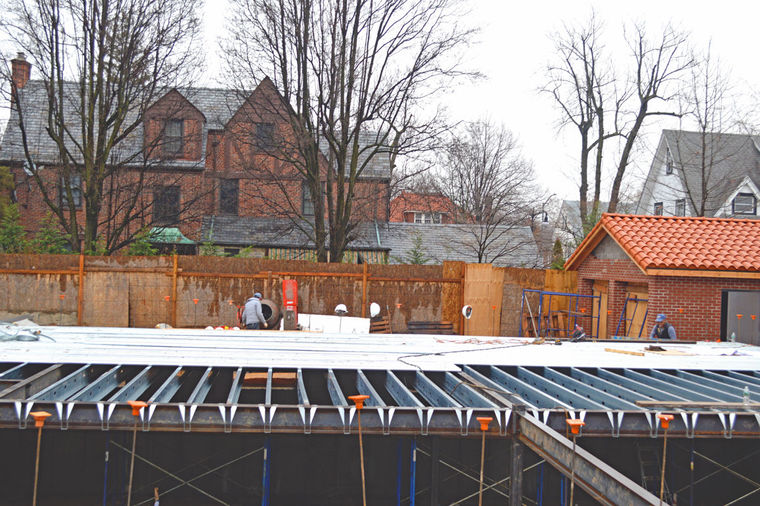From the Queens Chronicle:
According to Broadway-Flushing Homeowners Association President Janet McCreesh, the issue of Airbnb home sharers using houses in the neighborhood — much of which has a restrictive covenant limiting houses to single-family usage — is largely over.

A car sits on pavers in a yard at 35-28 163 St. in Broadway-Flushing. The Department of Buildings issued a violation for noncompliance with residential area parking regulations at the house, which along with two other locations has caused concern among homeowners.
“We have managed to get all of the homes, I think, on the Airbnb website,” she told the Chronicle. “We initiated lawsuits.”
But Broadway-Flushing is not without other home-related problems. McCreesh estimates that 10 percent of the Flushing subneighborhood’s houses are illegally used for single-room occupancies or hotels.
In Broadway-Flushing, two houses with unusual aspects of their interiors are being built — though no one publicly contends any illegality could be afoot. Ten bathrooms and eight bedrooms are planned at 33-05 157 St.; seven bathrooms and seven bedrooms are planned at 33-62 159 St. Both buildings’ plans have been approved by the Department of Buildings.
“That is not the layout of your typical Queens single-family home,” McCreesh said, referring to the properties. “The law needs to change for this type of situation. This is not a 10-acre estate. This is a plot of land in Queens.”
“The DOB does not limit how many bathrooms you can have in a house,” she continued. “There’s nothing in terms of protection for architectural design.”
Construction is happening now at both of the locations. According to McCreesh, both of the properties are under the jurisdiction of the restrictive Rickert-Finlay Covenant of 1906, which requires that homes only be used by single families and covers much of Broadway-Flushing.
And the homeowners association president does not necessarily believe that the locations on 159th Street and 157th Street will be used for any other purpose, although she is very concerned.
“I have no reason to believe that the intention is to make a hotel,” she told the Chronicle. But, she added, “we have more and more homes being used illegally every day.”
After the homeowners association filed a zoning challenge on Dec. 5 for the 157th Street property to the Department of Buildings saying that the side yard was too small, the agency agreed with the determination. A subsequent audit of plans were approved by the DOB on Dec. 22.
Thomas Chang, the owner of 33-62 159 St., and Xin Geng, one of the owners of 33-05 157th St., could not be reached for comment.
In any case, Chang and Geng will find a kind neighborhood association in Broadway-Flushing, according to Joseph Brostek.
“We are a very welcoming community and we appreciate people who want to come in here and join the association,” Brostek, the communications chairman of the homeowners association, said.
Because the Department of Buildings does not enforce the covenant, the homeowners association sues homeowners it believes are in violation of it. Recently, the association sued to stop a building in the neighborhood that it thought was being used as a hotel.
Although many in the neighborhood want it to have historic status — a designation that would require that homes built in it meet a set of criteria that preserve the architectural character of the community — the Landmarks Preservation Commission has declined it for Broadway-Flushing.
Nonetheless, the Broadway-Flushing Historic District has been recognized by the National Register of Historic Places and the New York State Historic Preservation Office.
State Sen. Tony Avella (D-Bayside) introduced legislation that would create a designation called “architectural districts” that could protect certain neighborhoods from having houses built in them that are aesthetically different from most of the area homes.
While the bill does not specifically mention interior areas as being regulated by architectural districts, a spokesman for the senator said that the rules for the designation could evolve in a way that would include them, because the Landmarks Preservation Commission would be in charge of giving the special status to neighborhoods and could change the rules for them.
Avella did not immediately return a request for comment.
“I don’t know specifically if there are ways you could mandate how people model the interior of their homes,” Assemblyman Ed Braunstein (D-Bayside), a supporter of the architectural districts legislation, said.
“We have fought to keep our community a one family residential neighborhood and that’s how it will stay,” Councilman Paul Vallone (D-Bayside) said in a prepared statement. “We have already submitted legislation to create penalties and increase fines for renting property illegally and have joined with our partners in Albany to do the same on the state level.”
According to Assemblyman Ron Kim (D-Flushing), illegal conversions like SROs and hotels in Broadway-Flushing are dangerous for the people staying there and can cause trouble for other residents.
“I think part of the reason why [Con Edison] has shortages on the hot summer days is because of so many of these illegally converted units not just in Flushing but all around Queens,” he said.
Flushing resident Paul Graziano, who is running against Vallone in the Democratic primary race for his seat, says that he would introduce legislation that would amend the building code to regulate interior designs for single-family homes to make them less viable for usage by more than one family.
“I would introduce legislation to this effect that would remove the ability to create hotel situations in single family homes,” he said. Graziano added that the bill could limit the number of bathrooms or number of master bedroom suites per a certain amount of square feet.


{ 0 comments… add one }